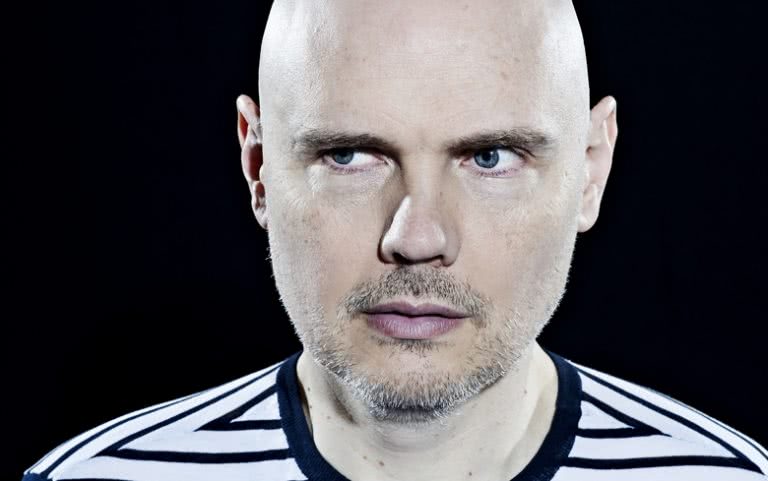I still remember how we met. A friend’s backyard, schnapps from the bottle, jumping from balconies. And thrumming over it all, the ominous, disaffected observation that the world is a vampire. It was unlike anything we had heard before. We knew grunge, of course – these were the days when Eddie Vedder ruled the known musical world – we knew rock, pop, punk. But withMellon Collie And The Infinite Sadness, the schoolyard soundtrack went entirely off the rails. The Smashing Pumpkins made music that just didn’t seem to fit anywhere else, and we flattered ourselves that in this regard it was music made for us.
“I have to say, it all feels like an unfolding story,” Billy Corgan says in an unexpectedly deep voice. “Somebody said the other day, ‘Your recent work doesn’t sound like your past work,’ and yeah, so it shouldn’t! But then you’ll hear in the next breath, ‘I hear echoes of the past,’ and, well, that’s also true. It’s the same person, it’s the same teeth that the sound is passing through. [On new album Monuments To An Elegy] the only intention was to try to make contemporary music. There’s a part of me that doesn’t want to be connected to contemporary music because I don’t like it, and there’s a part of me that acknowledges that living in that world, well, maybe I need to be.”
Though Corgan’s voice is still unmistakable, it is now much richer – pleasantly weathered. While voice is intrinsic to identity, most of us are never going to be particularly conscious of how it develops, despite being one of the strongest hallmarks of who we are and how others come to know us. How strange it must feel to Corgan, stumbling across his earlier self while waiting at traffic lights or walking into a supermarket.
“Well, I never wanted to be a singer, I think that’s where the answer starts. I couldn’t hear the notes in my head, so I had to work out the melody on the guitar and then try to sing like the guitar. So from the early work on, you’re hearing someone who doesn’t like his voice and is trying to find a way to use it in a unique way. After Mellon Collie, I wanted to move into different work but I reached a point where as a composer I was becoming frustrated with the singer in me. So that began a very different journey. Can I actually sing complex melodies in a way that has control, that has authorship? And that’s been a really long journey for me. Trying to learn how to sing in a way that I’m controlling the vocals, the vocals aren’t controlling me.”
The difficulties Corgan has faced in having these lyrics realised is a concern that never strays far from the conversation. Given the fervour with which his fans pull apart the meanings and connections within each release, it’s little wonder. You feel that in another life, he could quite happily have been a writer.
“I should have been an author. I’m a voracious reader, one of those people who know a lot about nothing. I do find that there are certain writers that when I come into contact with their work, it makes me want to try better. People like Bob Dylan or Shakespeare, Ernest Hemingway, writers that ask you to re-examine the comfort you have with your language. Have you ever read any Burroughs?”
I have, and outside of Burroughs’ writing, it has always been my ambition to emulate his art techniques; to make a hallway of canvas lined with spray-paint cans, and then fire a shotgun down the middle.
“Ha, I actually have one of those shotgun paintings. It was a gift from a former lover. I wasn’t crazy about it, but you know, I loved him and so it works for me. But Burroughs had that concept of the word virus. He talked about how certain cultures don’t have certain words, say, the word ‘jealousy’ for example. And then a particular word can get into somebody’s system and just rumble around. He showed me we have a standard comfort in the way we use language, and by juxtaposing certain lyrical images you can create a kind of violence. You can have the same three words, but if you put the third one first, the first word second, that’s suddenly violent in the sense of how you would ordinarily hear them.”
While it’s a fascinating approach to songwriting, it’s difficult to imagine many contemporary mainstream artists adopting Burroughs’ linguistic preoccupations.
“I mean, look,” he laughs, “pop music, by and large, is dumb. It’s just getting them out to the dancefloor. And there’s a joy to that. It doesn’t mean you have to get sucked into all its bullshit, but there is a certain joy to the right track on the right day. But I just don’t think I have the same enthusiasm for it. When I finally do break from it all, which will probably be sooner rather than later, people will be surprised because the language on the other music that I want to do is vastly different to my usual work. It doesn’t sound like the Pumpkins, and that’s not so much me trying to be different – I just am different. A different language, which I know doesn’t really have a place in pop music at all.”
Monuments To An Elegy out now through Martha’s Music/Cooking Vinyl. Catch them atHordern Pavilion onWednesday February 25, tickets online.Also appearingatSoundwave Festival 2015alongsideFaith No More, Soundgarden, Slash, Incubus, Slipknot, Fall Out Boy and many more atSydney Olympic ParkfromSaturday February 28 to Sunday March 1.


































